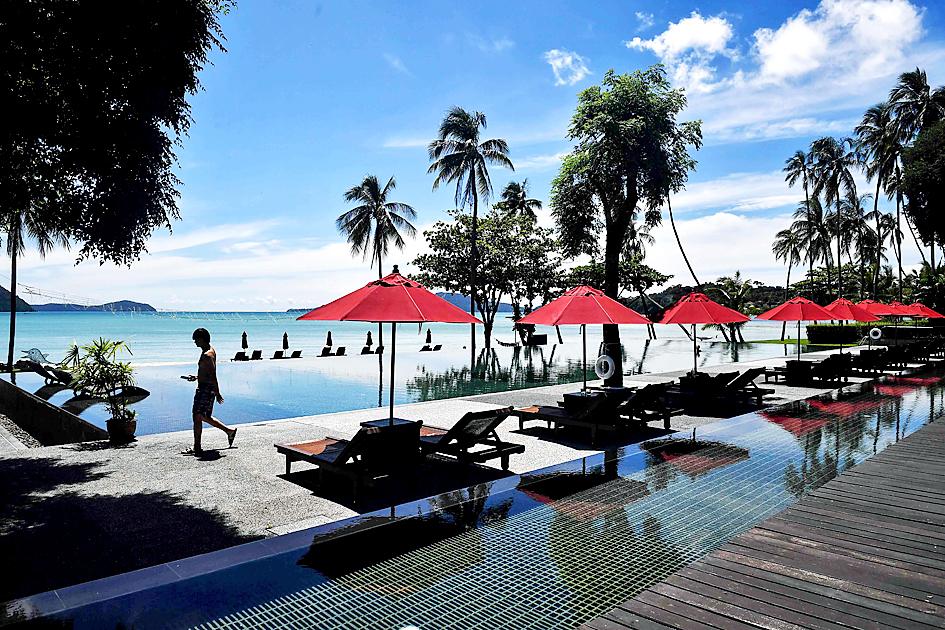Phuket’s go-go dancers sat playing on their smartphones in empty bars lining deserted streets as the Thai tourist island reeled from the ravages of the COVID-19 pandemic with little sign of any recovery soon.
Swimming pools were empty, chairs were stacked high in deserted restaurants and normally packed beaches were so quiet they were even seeing rare species of sea turtle arriving to nest.
Last year, more than 9 million tourists visited Phuket, the kingdom’s second-most popular destination after Bangkok.

Photo: AFP
Today, nearly all of the island’s 3,000 hotels are closed and the main town of Patong has become a “ghost town,” said local tycoon Preechawut Keesin, who owns five nightclubs and about 600 hotel rooms.
Thailand has so far remained relatively unscathed from the global outbreak, with about 3,600 confirmed cases and just a few dozen deaths.
However, the kingdom’s decision to concentrate on beating the virus has dealt a brutal blow to the economy, which is expected to contract 7 to 9 percent this year and leave millions unemployed.
“My boss wants to help the staff keep their jobs, but I don’t think we can survive after the end of the year,” said Jantima Tongsrijern, manager of Pum Pui bar.
In normal times, 80 percent of the island’s profits come from tourism, a sector that employs more than 300,000 people.
Tens of thousands of those who have lost their jobs have returned to their home provinces.
Life is hard for those sticking it out.
Some have accepted huge pay cuts, while others have little choice but to join the long lines at the food distribution centers or scrape together an income where they can.
Bar owner Orathai Sidel said she used to make 100,000 baht (US$3,227) a month in high season.
With her business a victim of the pandemic, she now sold desserts from a streetside cart, making just US$3 a day to try to cover her children’s school fees.
“We’re just fighting to survive,” said street vendor Poi, fired in June from the restaurant where she used to work.
Phuket has been due to welcome Thailand’s first foreign tourists since April in a cautious experiment by the kingdom, but their arrival keeps being pushed back.
A two-week compulsory quarantine and a high price tag — several thousand US dollars a person — would mean this is a niche market.
“We will have to focus on developing local customers and individual travelers rather than mass tourism,” Preechawut Keesin said.
Before the pandemic, domestic holidaymakers only made up 30 percent of visitors to Phuket, prompting the local tourism industry to rethink its business model.
Trial packages are being offered to domestic tourists for as low as US$30 for two nights, flights included from Bangkok — but the rock-bottom prices mean hotels will likely not even recover their costs.
“We don’t expect a return to normal for three years,” said Kongsak Khoopongsakorn, the president of the Thai Hotels Association’s southern chapter. “The situation is much worse than after the tsunami in 2004.”

WEAKER ACTIVITY: The sharpest deterioration was seen in the electronics and optical components sector, with the production index falling 13.2 points to 44.5 Taiwan’s manufacturing sector last month contracted for a second consecutive month, with the purchasing managers’ index (PMI) slipping to 48, reflecting ongoing caution over trade uncertainties, the Chung-Hua Institution for Economic Research (CIER, 中華經濟研究院) said yesterday. The decline reflects growing caution among companies amid uncertainty surrounding US tariffs, semiconductor duties and automotive import levies, and it is also likely linked to fading front-loading activity, CIER president Lien Hsien-ming (連賢明) said. “Some clients have started shifting orders to Southeast Asian countries where tariff regimes are already clear,” Lien told a news conference. Firms across the supply chain are also lowering stock levels to mitigate

IN THE AIR: While most companies said they were committed to North American operations, some added that production and costs would depend on the outcome of a US trade probe Leading local contract electronics makers Wistron Corp (緯創), Quanta Computer Inc (廣達), Inventec Corp (英業達) and Compal Electronics Inc (仁寶) are to maintain their North American expansion plans, despite Washington’s 20 percent tariff on Taiwanese goods. Wistron said it has long maintained a presence in the US, while distributing production across Taiwan, North America, Southeast Asia and Europe. The company is in talks with customers to align capacity with their site preferences, a company official told the Taipei Times by telephone on Friday. The company is still in talks with clients over who would bear the tariff costs, with the outcome pending further

Six Taiwanese companies, including contract chipmaker Taiwan Semiconductor Manufacturing Co (TSMC, 台積電), made the 2025 Fortune Global 500 list of the world’s largest firms by revenue. In a report published by New York-based Fortune magazine on Tuesday, Hon Hai Precision Industry Co (鴻海精密), also known as Foxconn Technology Group (富士康科技集團), ranked highest among Taiwanese firms, placing 28th with revenue of US$213.69 billion. Up 60 spots from last year, TSMC rose to No. 126 with US$90.16 billion in revenue, followed by Quanta Computer Inc (廣達) at 348th, Pegatron Corp (和碩) at 461st, CPC Corp, Taiwan (台灣中油) at 494th and Wistron Corp (緯創) at

NEGOTIATIONS: Semiconductors play an outsized role in Taiwan’s industrial and economic development and are a major driver of the Taiwan-US trade imbalance With US President Donald Trump threatening to impose tariffs on semiconductors, Taiwan is expected to face a significant challenge, as information and communications technology (ICT) products account for more than 70 percent of its exports to the US, Chung-Hua Institution for Economic Research (CIER, 中華經濟研究院) president Lien Hsien-ming (連賢明) said on Friday. Compared with other countries, semiconductors play a disproportionately large role in Taiwan’s industrial and economic development, Lien said. As the sixth-largest contributor to the US trade deficit, Taiwan recorded a US$73.9 billion trade surplus with the US last year — up from US$47.8 billion in 2023 — driven by strong